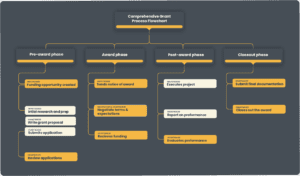Education is the key to a better future, but it can be expensive. That’s why there are many grants for students in Nigeria available to help students pay for their tuition fees.
In the ever-evolving landscape of education in Nigeria, the pursuit of academic excellence often comes hand-in-hand with financial challenges. However, for students in Nigeria this year, the horizon is bright with a wealth of opportunities.
This blog post is your gateway to discovering the top grants available, specially curated to empower Nigerian students on their educational journeys.
Whether you are a passionate undergraduate, an aspiring postgraduate, or a dedicated researcher, this guide will unveil the diverse range of funding options tailored to your academic needs.
Join us on this enlightening journey as we explore these grants for students in Nigeria that hold the promise of unlocking doors to knowledge, innovation, and a brighter future.
In Nigeria, there are several grants available to students, both local and international.
Key Takeaways
- One excellent method to help afford the high expense of a university education without taking out student loans or balancing part-time employment with your studies is to apply for a university scholarship.
- Scholarships offer financial aid based on need, merit, or certain requirements, like a field of study or local government region, and can lead to access to high-quality education.
Student Grants in Nigeria this Year
Nigerian students have access to a wide array of grants to support their education and career aspirations.
These grants cover various fields, including STEM, arts, and social sciences. From government scholarships to private foundation grants, students can find financial assistance tailored to their needs.
To make your search easier, we have compiled a comprehensive list of the top student grants available in Nigeria this year.
This list will help you explore your options and take the first step toward achieving your educational goals.
You can also go through Top 15 Grants for Female Entrepreneurs in Nigeria, 2024
Types of funding options available for students in Nigeria
Navigating the world of education can be financially challenging, but for Nigerian students, there are funding options available that can ease the burden.
Whether you’re an undergraduate seeking scholarships or a graduate student pursuing research funding, understanding the diverse range of grants and scholarships can make all the difference.
Listed below are various methods that provide education funds to the students:
Sponsorship
Sponsorship is a valuable funding option for Nigerian students seeking to further their education. It involves securing financial support from individuals, organizations, or companies to cover tuition fees, accommodation, and other educational expenses.
Scholarship
Scholarships are a popular funding option for Nigerian students seeking higher education. They provide financial assistance to cover tuition fees, accommodation, and other educational expenses. Some types of Scholarships include Merit-Based Scholarships, awarded based on academic excellence, standardized test scores, or extracurricular achievements. Second is Need-Based Scholarships granted to students who demonstrate financial need. The third one Athletic Scholarships offered to talented athletes to support their academic and athletic pursuits.
Visit this site for new and existing scholarship for students in Nigeria.
Education Loans
Education loans make higher education accessible to a wider range of students, regardless of their financial background. The Nigerian government, through initiatives like the Nigerian Education Loan Fund (NELF), aims to provide affordable loans to students. These initiatives aim to reduce the financial burden on students and their families.
Aids and Grants
Aids and grants offer significant financial support to Nigerian students pursuing higher education. These non-repayable funds can alleviate the financial burden associated with tuition fees, accommodation, books, and other academic expenses.
Read more to know how to raise grants effectively.
Part time Jobs
Part-time jobs can be a valuable tool for Nigerian students to supplement their income and contribute to their educational expenses. While academic pursuits remain the primary focus, balancing studies with work can provide financial relief and valuable practical experience.
Popular Part-Time Job Options for Students:
- Tutoring: Leveraging academic strengths, students can tutor younger students in subjects like math, science, or languages.
- Freelancing: Skills in writing, graphic design, programming, or digital marketing can be monetized through freelance platforms.
- Online Work: Virtual assistant roles, customer service, or data entry can provide flexible work opportunities.
- Campus Jobs: Many universities offer part-time jobs on campus, such as library assistants, lab assistants etc,.
The Top 10 Annual Student Grants in Nigeria

1. Petroleum Technology Development Fund (PTDF) Scholarship Scheme
This is a federal government scholarship that provides funding for undergraduate and postgraduate studies in petroleum engineering and related fields.
2. Nigerian National Petroleum Corporation (NNPC)/Chevron Scholarship
This is a joint scholarship program between the Nigerian National Petroleum Corporation (NNPC) and Chevron Corporation that provides funding for undergraduate and postgraduate studies in petroleum engineering and related fields.
3. Shell Nigeria Scholarship Scheme
This is a scholarship program offered by Shell Petroleum Development Company of Nigeria Limited to support the education of talented Nigerian students.
4. MTN Foundation Scholarship
This is a scholarship program offered by the MTN Foundation to support the education of talented Nigerian students from low-income families.
5. Jim Ovia Foundation Scholarship
This is a scholarship program offered by the Jim Ovia Foundation to support the education of talented Nigerian students from low-income families.
Related How to Raise Grants Effectively: A Step-by-Step Guide
6. Chevening Scholarship
This is a UK government scholarship that provides funding for one-year Master’s degrees in the UK.
7. Gates Cambridge Scholarship
This is a scholarship program offered by the Bill and Melinda Gates Foundation to support students from developing countries to pursue postgraduate studies at the University of Cambridge.
8. Ford Foundation Scholarship
This is a scholarship program offered by the Ford Foundation to support students from developing countries to pursue postgraduate studies at leading universities in the United States.
9. Mandela Washington Fellowship for Young African Leaders
This is a fellowship program offered by the US State Department to support young African leaders to develop their leadership skills and contribute to the development of their communities.
10. Tony Elumelu Foundation Entrepreneurship Programme
This is an entrepreneurship program offered by the Tony Elumelu Foundation to support African entrepreneurs to start and grow their businesses.
For information on funding for students in Nigeria, visit https://www.nigeriaeducation.info/education-funding.
How to Apply for students grants

After you discover a grant you want to apply for, take note of these:
Grants are country specific and each one of them has different conditions.
Furthermore, the eligibility criteria, rules, dates, application forms and procedures also vary according to the different organizations.
Student Grants may include Maintenance Grant or a Fee Grant, which is decided according to the eligibility of the candidate.
Before applying, students should go through the various eligibility criteria and then fill the appropriate application form.
In many cases a test is taken whereby, students have to mention their nationality and means of livelihood.
Know that students who receive Grants are usually contacted directly and their names are published on the website of the grants organisation.
A typical grant application process looks like this:
- Plan to Apply. Plan ahead, assess funding opportunities, and take other early steps
- Write Application
- Submit application
- Review by grant awardee
- Awarding of grants
- Post-Award Monitoring and Reporting.
Usually different types of Grants are awarded for different levels of education, such as primary, secondary and post- secondary education. In such a case, the students may consult with their colleges and financial aids departments to get latest information on the available Grants and their eligibility criteria.
Conclusion
These are just a few of the many grants for students in Nigeria. If you are looking for financial assistance to pay for your education, be sure to do your research and find a grant that is a good fit for you.
Frequently Asked Questions
How do I apply for a grant?
The application process for grants varies depending on the grant. However, most grants require you to submit an application form, which typically includes information about your academic background, financial need, and proposed project. You may also need to provide letters of recommendation and other supporting documents.
What are the eligibility requirements for grants?
The eligibility requirements for grants vary depending on the grant. However, most grants require you to be a Nigerian citizen and be enrolled in a full-time undergraduate or postgraduate program. Some grants may also have other eligibility requirements, such as a minimum GPA or financial need.
How long do grants last?
The length of time that grants last varies depending on the grant. Some grants are one-time awards, while others provide funding for multiple years.
Where can I find information about grants?
There are many resources available to help you find information about grants. You can search online, contact your school’s financial aid office, or contact a grant-making organization.


